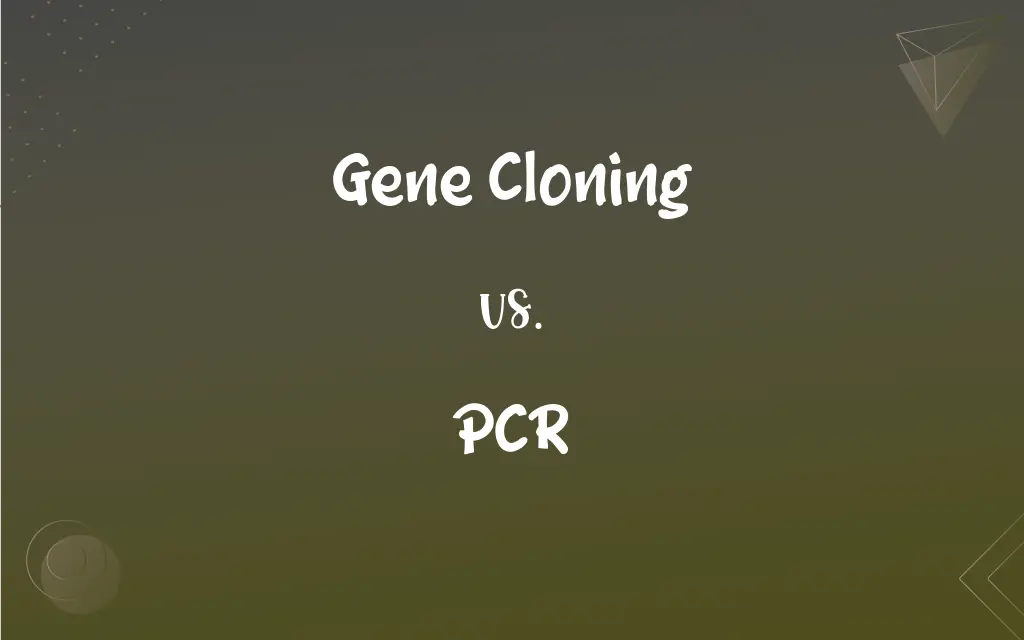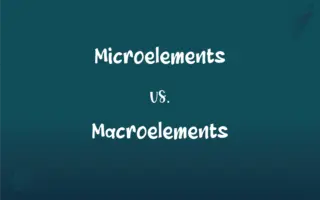Gene Cloning vs. PCR: What's the Difference?
Edited by Janet White || By Harlon Moss || Updated on October 29, 2023
Gene cloning involves creating copies of a gene within a host organism; PCR (Polymerase Chain Reaction) amplifies DNA segments rapidly in a test tube.

Key Differences
Gene cloning entails inserting a specific gene into a host organism, leading to the production of multiple copies of that gene. PCR, on the other hand, is a laboratory technique used to amplify a specific DNA segment without the need for a host.
The process of gene cloning often involves the use of vectors, such as plasmids, to transfer and replicate the gene of interest in a host organism. PCR utilizes primers, DNA polymerase, and thermal cycling to exponentially amplify targeted DNA sequences.
Gene cloning results in the production of multiple copies of a gene within a living organism, which can then express the protein coded by the gene. PCR allows for rapid amplification of DNA in vitro, often used for diagnostic or research purposes.
While gene cloning is a method for producing multiple copies of a gene for further study or use in protein production, PCR is primarily used for analyzing DNA, such as in forensic science or genetic testing.
The applications of gene cloning extend to producing pharmaceuticals and genetically modified organisms. In contrast, PCR has a wide range of applications including DNA sequencing, diagnosis of diseases, and detection of pathogens.
ADVERTISEMENT
Comparison Chart
Definition
Creating multiple copies of a gene in a host organism
Amplifying DNA segments rapidly in a test tube
Process
Involves transferring a gene to a host using vectors
Uses primers and DNA polymerase for amplification
Result
Produces gene copies within a living organism
Yields amplified DNA in vitro
Main Use
Protein production, GMO creation
DNA analysis, diagnostics
Technique
Requires host organism for gene expression
Does not require a host; performed in a lab setting
ADVERTISEMENT
Gene Cloning and PCR Definitions
Gene Cloning
The production of genetically identical gene copies.
Gene cloning led to a breakthrough in producing growth hormones.
PCR
A process for amplifying DNA without a host organism.
PCR allowed for the quick replication of DNA sequences for sequencing.
Gene Cloning
The process of creating multiple copies of a specific gene.
Gene cloning was used to produce insulin in bacteria.
PCR
Polymerase Chain Reaction, a tool for DNA analysis and cloning.
PCR was used to confirm the presence of a genetic mutation.
Gene Cloning
A method for transferring and replicating a gene in a different organism.
Gene cloning allowed for the creation of genetically modified crops.
PCR
A laboratory technique for rapidly amplifying DNA.
PCR was instrumental in identifying the suspect's DNA at the crime scene.
Gene Cloning
A technique to replicate a gene within a host organism.
Scientists utilized gene cloning to study the effects of a particular gene.
PCR
A technique involving cycles of heating and cooling to duplicate DNA.
PCR enabled rapid detection of the pathogen in patient samples.
Gene Cloning
Replication of a specific gene for research or therapeutic purposes.
Through gene cloning, researchers were able to analyze the function of a newly discovered gene.
PCR
A method for making multiple copies of a DNA segment.
Researchers used PCR to amplify a specific gene for further study.
FAQs
What are the applications of gene cloning?
Applications include producing pharmaceuticals, studying genes, and creating genetically modified organisms.
How does gene cloning differ from PCR?
Gene cloning involves replicating genes within a host organism, while PCR amplifies DNA segments in a test tube.
Why is PCR considered a revolutionary technique?
PCR revolutionized molecular biology with its rapid and precise DNA amplification.
Can gene cloning be used for protein production?
Yes, gene cloning is often used to produce proteins in host organisms.
Can gene cloning introduce a foreign gene into an organism?
Yes, gene cloning can be used to introduce and express foreign genes in an organism.
Is gene cloning used in genetic engineering?
Yes, gene cloning is a fundamental technique in genetic engineering.
What role do vectors play in gene cloning?
Vectors, like plasmids, are used to transfer and replicate the gene in the host organism.
How do gene cloning and PCR contribute to research?
Both techniques are essential for studying genes, proteins, and disease mechanisms.
Can PCR be used for paternity testing?
Yes, PCR is commonly used in paternity testing and forensic analysis.
What is gene cloning?
Gene cloning is the process of making multiple copies of a specific gene within a host organism.
What is PCR?
PCR (Polymerase Chain Reaction) is a laboratory technique used to rapidly amplify segments of DNA.
What are the uses of PCR?
PCR is used in DNA sequencing, disease diagnosis, and forensic analysis.
Is a host organism required for PCR?
No, PCR is performed in vitro without the need for a host organism.
What is a major advantage of gene cloning?
It allows for the study and production of specific proteins coded by the cloned genes.
Can both gene cloning and PCR be automated?
Yes, both processes can be automated for high-throughput applications.
Can PCR detect specific DNA sequences?
Yes, PCR can specifically amplify and detect targeted DNA sequences.
Do both techniques require DNA to start with?
Yes, both gene cloning and PCR require an initial DNA template.
What are primers in PCR?
Primers are short DNA sequences that initiate the PCR amplification process.
Is PCR useful in medical diagnostics?
Absolutely, PCR is widely used in diagnosing infections and genetic diseases.
How fast is PCR compared to gene cloning?
PCR is much faster, amplifying DNA within hours, while gene cloning takes days to weeks.
About Author
Written by
Harlon MossHarlon is a seasoned quality moderator and accomplished content writer for Difference Wiki. An alumnus of the prestigious University of California, he earned his degree in Computer Science. Leveraging his academic background, Harlon brings a meticulous and informed perspective to his work, ensuring content accuracy and excellence.
Edited by
Janet WhiteJanet White has been an esteemed writer and blogger for Difference Wiki. Holding a Master's degree in Science and Medical Journalism from the prestigious Boston University, she has consistently demonstrated her expertise and passion for her field. When she's not immersed in her work, Janet relishes her time exercising, delving into a good book, and cherishing moments with friends and family.































































